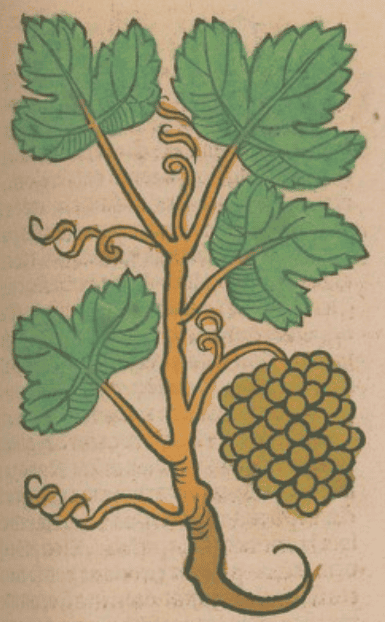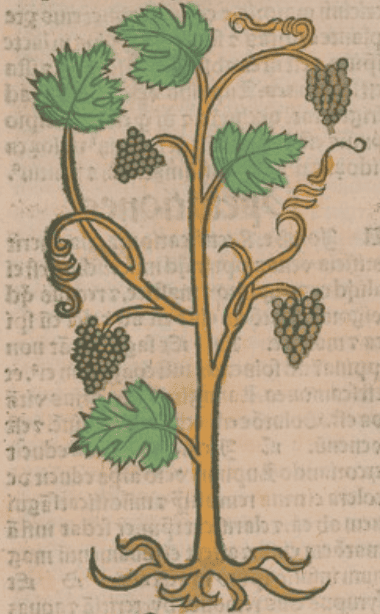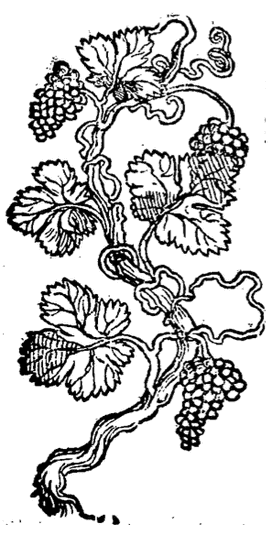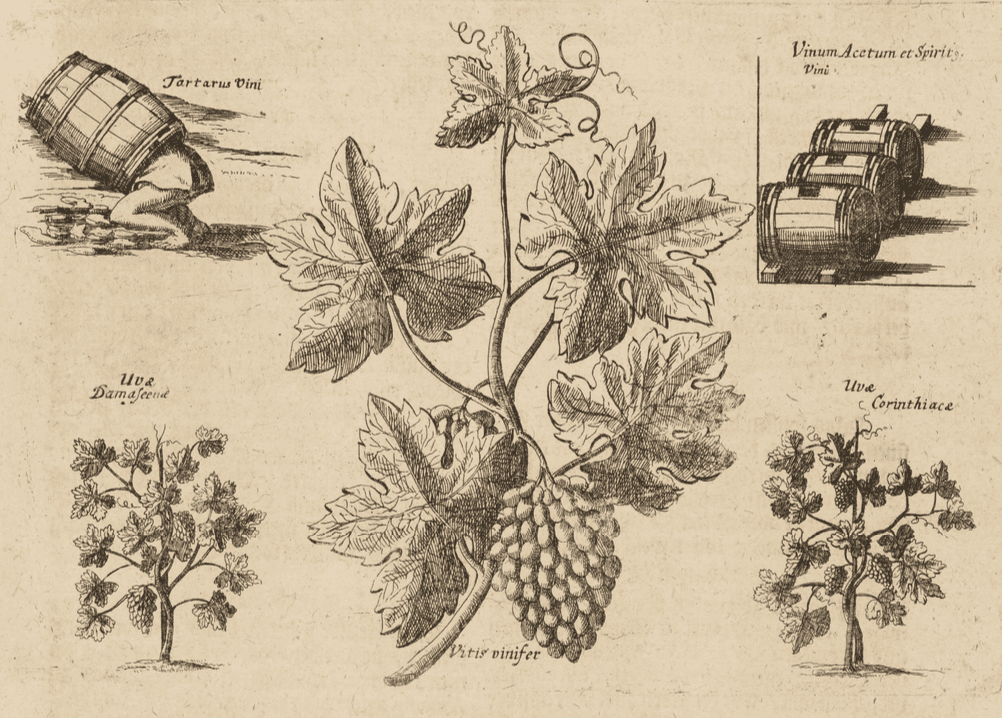Vitis, Grape Vine
VineDrakshadi (Raisins, Ayurveda)
Pu Tao 葡萄 (TCM)
Kishmish (Raisins, Unani)
rgun brum རྒུན་འབྲུམ (Raisins, Tibetan)

|

|
Ortus Sanitatis, Meydenbach, 1491

|

|
|
Dioscorides Materia Medica, Ruellio, 1549 |
Medical Botany, Stephenson and Churchill, 1836 |
 Grape Vine and Wine
Grape Vine and WineMuseum Museorum, Valentini, 1704
 Grapes (Adam, 2017)
Grapes (Adam, 2017)

|

|
Botanical name:
Vitis vinifera
Parts used:
Grapes, Unripe Grapes, Raisins, Wine
A number of different types of Raisins are used.
1. Passula Maximae; Damask Raisins; large, yellow-brown, sweet
2. Passula Minores; Raisins of Provence; smaller, sweet; similar to and often substituted for Damask Raisins
3. Passula Minima, or Corinthiacae; Corinthian Raisins; small, dark purple, without seeds, sweet and acid
4. Uva Passula Majores; Raisins of the Sun (dried upon the grape vine)
5. Uva Passula Malacensis; Malaga Raisins
Less commonly Stem, Leaf, Juice or Tears, Root
Temperature & Taste:
Leaf: Cool, dry.
Raisins: Warm, moist. Sweet
Classifications:
2L. EMOLLIENT.
3J. INCREASE SEMEN. 3K. EXPECTORANT. 3L. ANTI-TUSSIVE
4d. PECTORAL. 4e. STOMACHIC. 4g. HEPATIC
Uses:
RAISINS:
1. Strengthens and Nourishes the Lungs:
-coughs, roughness of the windpipe, acute and chronic bronchitis, hoarseness, shortness of breath, bronchiecstasis, difficulty breathing;
-added to compositions to restore in consumption and chronic Lung disease.
-strengthen Lung Qi, nourishes Lung Yin.
2. Tonifies the Qi and Blood:
-increases Qi, nourishes the blood; Anemia (West, TCM)
-Blood deficient Wind, causing Tics and Spasms, Dizziness. (TCM, Korea)
-Palpitation, Insomnia from Heart Blood deficiency (TCM)
-cleanses arterial walls of plaque, aids in the circulation of blood. Therefore good to help prevent Heart attacks etc.
-to ‘augment the Blood’, take 7 drams of Raisins (The Secrets of Alexis, 1615)
-Threatened Miscarriage (TCM)
-also for deficient Milk following Childbirth (Korea)
3. Nourishes the Kidney Yin, Clears Heat:
-Kidney and Bladder pain with hot, sharp urine (Gerard)
-Strangury, Difficult Urination (West, TCM)
-Edema; recommended for children who have enuresis to eat some every day.
-restores in Consumption and Hectic fevers (West); Night-sweats (Korea)
-debility, old age.
-benefits the tendons, bones and joints, Arthritic complaints and Rheumatism
-Lumbago, Rheumatalgia (Korea)
4. Clears Heat and Poison, Promotes Stool:
-benefits the Liver, and to open and cleanse, and promote stool
-biliousness, hepatitis and jaundice
-gastritis, colitis and constipation
-Measles (Korea)
VINE & LEAF:
1. Cools the Blood, Stops Leakage and Bleeding:
-hemoptysis, chlorosis, as well as excess menstruation, varicose veins, hemorrhoids, and phlebitis;
-diarrhea, dysentery, leukorrhea and spermatorrhea
2. Clears Stomach Heat:
-vomiting and heartburn, as well as all hot fluxes of the belly from heat;
-Stomach heat with Fever, thirst, constipation, toothache or headache;
-mouth and tongue sores and ulcers.
3. Clears Heat and Damp, Promotes Urine:
-Edema, Difficult Urination (TCM)
4. Clears Wind and Damp:
-Rheumatic Joint pain
-Hypertension, high Cholesterol, Obesity
5. Clears Heat and Poison, Resolves Masses:
-used in the treatment of Cancer (leaves, tendrils and fruit)
-Conjunctivitis and Redness of the Eyes topically (Korea)
SAP and SALT FROM THE ASHES:
Used for Urinary stones
JUICE of the UNRIPE FRUIT:
‘Better in all hot diseases than Vinegar’.
Comment:
‘… take this Rule in general, that in all cathartic or detergent Compositions, those which the Grocers sell by the Name of Raisins of the Sun, are most proper; because they are sharp, and attenuating: But in all Pectorals and Vulneraries, the Malaga Raisins are much to be preferred; they being more fat, soft and emollient. Which by the Way is a Difference very few attend to, to the great Detriment of many a good Prescription.’ (Dr. Quincy, out of A Treatise on Foreign Drugs, Geoffroy and Thicknesse, 1749)
Preparations:
1. Raisins are ‘stoned’ (seeds removed) for use as the seeds ‘so much the harder pass through the body, and do quicklier and more easily cause obstructions’.
2. In Unani, they are roasted for Cough. Likewise in Tibetan Medicine, they are commonly used in powders and pills for Cough and Lung disease in which case they are roasted to facilitate powdering.
Dose:
1. As noted above, Raisins are best in laxative and opening medicines, Malaga Raisins are better in Lung medicines. Sultanas are also suitable for Lung medicines.
RAISINS: 6–8, every 2–4 hours during the day, and up to 9 can be added to a decoction. As a laxative, soak 12 or more Raisins in a cup of warm water, leave overnight, and drink in the morning;
FRESH GRAPES: 5–8 ounces can be taken once or twice daily;
GRAPE JUICE (Dark Grapes are best): 100–300mls., usually diluted, 1–2 times daily.
ASHES of the BARK, TWIGS or ROOT: 1–2 teaspoonfuls in plenty of water, 2–3 times daily;
SALTS of the BARK, TWIGS or ROOT: ½–1 teaspoonful of the salts can be added to a wineglassful of Wine, and this taken in teaspoonful doses.
Substitutes:
Figs; Sultanas and Raisins may substitute each other (Unani)
Correctives:
1. Oxymel, Poppy seed (Unani);
2. according to Tacuinum Sanitatus (13th C.?), they are corrected with Sour Pomegranates.
Main Combinations:
Raisin & Licorice
1. Cough, Raisins with Dates and Long Pepper made into a paste with Ghee and Honey (Ayurveda)
2. For Lung diseases, Raisins with Dates, Figs and Licorice.
3. Cough, Hoarseness, Asthma, Lung weakness, Raisins with Dates, Figs, Licorice, Barley, Maidenhair, Hyssop, Coltsfoot (as in Pectoral Decoction)
4. For diseases of the Throat including Hoarseness, Laryngitis, Tonsillitis, Raisins with Cyperus rotunudus, Ginger, Picrorhiza, Black and Long Pepper, Barberry, and Triphala (as in Drakshadi Churna, or Powder of Raisins, of Ayurveda)
5. Chronic Lung disease, Cough, chronic Asthma, difficulty Breathing, Raisins with Tabasheer, Safflower, Licorice, Cinnamon and Pomegranate (as in Raisin 7 of Tibetan Medicine)
6. Catarrh, combined equal parts of Decoction of Raisin and Lime Water. (A Treatise on Foreign Drugs, Geoffroy and Thicknesse, 1749)
7. To strengthen the Stomach and promote Digestion, Raisins with Clove, Cardamon, Valerian, Cinnamon, Saffron (as in Syrup of Raisins of Unani)
8. As a Restorative Tonic in Anemia, Debility, as well as Cough and Bronchitis, Raisins with Cinnamon, Cardamon, Ginger, Long Pepper, Black Pepper, Nutmeg, Coriander seed, Sandalwood and Saffron
9. To cleanse and strengthen the Brain, Raisins with Coriander seed, Yellow, Black, Belleric and Emblic Myrobalans (as in Electuary [Itrafal] of Raisins of Unani)
10. Biliousness, Raisins with Chebulic Myrobalan and Sugar (Ayurveda)
11. Strangury, Raisins, Sugar and Whey prepared as a potion, “This is declared to be an unfailing medicine for strangury”. (The Bower Manuscript, Ayurveda)
12. As a mild laxative:
i. Raisins decocted with dried Figs and Licorice. It can be enhanced by adding Senna or Rhubarb with Aniseed if needed.
ii. Decoct Raisins (2 oz.) and Licorice (1 dram) in Water (3 lbs. down to 2 lbs.), adding Senna (3 drams) towards the end.
Major Formulas:
Decoction for Asthma (Zacharia)
Decoction for Asthma and Difficulty Breathing
Decoction of Hyssop and Coltsfoot (Wirtzung)
Decoction of Marshmallow root
Decoction of Senna
Decoction to Cool
Pectoral Decoction (Augustana)
Syrup Against Consumption
Electuary of Life (Arnold de Villa Nova)
Triphala Electuary of Raisins (Unani)
Antidotum Asthmaticus (Nicholas)
Elixir Salutis, Elixir of Health
Raisin 7 (Tibetan)
Raisin Electuary (Mrdvikadia Leha) (Ayurveda)
Raisin Tonic (Drakshadi Rasayana)
Powder of Raisins (Drakshadi Churna) (Ayurveda)
Clove 35 (Li shi so lnga).
Rhododendron 16 (Dwa lis bcu drug) (Tibetan)
Sea Buckthorn 5 (Star bu 5) (Tibetan)
Cautions:
Raisins are generally Safe.
1. ‘In inflammatory Fevers, or an hot State of the Bile, both Raisins and Currants ought to be avoided; for in these Disorders they increase the Effervescence of the Humours.’ (A Treatise on Foreign Drugs, Geoffroy and Thicknesse, 1749)
2. ‘Being too frequently eaten they are prejudicial to the Gums, as they vellicate and dispose them to Putrefaction’. (A Treatise on Foreign Drugs, Geoffroy and Thicknesse, 1749)
Main Preparations used:
Ashes of the Branches, Lohoch of Raisins, Honey of Raisins
-
Extra Info
-
History
|
‘Grapes, in Sanskrit Draksha, were known to the ancient Hindus, and are noticed by Susruta and Charaka; in the dried state they were used in medicine on account of their demulcent, laxative and cooling properties. It would also appear that a spirituous preparation was made from them, and was used as a stimulant under the name of Draksha-arishta, the receipt for making which is as follows:— Raisins, 12 ½ lbs., water 256 lbs., boil together until reduced to one-fourth and strain ; then add, treacle 50 lbs., cinnamon, cardamoms, folia Malabathri, flowers of Mesua ferrea, fruit of Aglaia Roxburghiana, black pepper, long pepper and seeds of Embelia ribes, all in fine powder, of each 2 3/4 ozs., and set aside for fermentation. Grapes are described by Dioscorides under the name of [?]; he also notices raisins and their medicinal properties. |
Pliny speaks of Uvae grapes, and acini passi, raisins. The [?] of the Greeks, Faex vini in Latin, is our Argol; the Milhel-Tartir of the Arabs. Mahometan writers consider grapes and raisins to be attenuant, suppurative and pectoral; the most digestible of fruit, purifying the blood and increasing its quantity and quality; they say that they are more wholesome if kept a few days after being gathered, and that the skin and stones should not be eaten. The ashes of the wood are recommended as a preventive of stone in the bladder, cold swellings of the testes, and piles; in the two last named diseases they are to be applied externally as well as given internally. The juice of unripe grapes, Husrnm, Arab., Ohureh, Pers., is used as an astringent; it is the [?] of Dioscorides, and tho Agresto of the modern Italians, who still use it in affections of the throat.’ (Vegetable Materia Medica of Western India, Dymock, 1885) |
